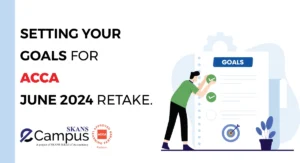Embarking on the journey to retake your ACCA Exam requires a strategic approach and a clear roadmap to success. Setting well-defined goals is the cornerstone of effective preparation, providing you with direction, motivation, and a framework for measuring your Improvement Strategies. We’ll explore the importance of goal setting in your ACCA June 2024 retake journey and provide practical insights on how to set goals to maximize your chances of success.
Understand the Importance of Goal Setting:
Before delving into the specifics, it’s crucial to understand why goal setting is essential for your ACCA retake. Goals serve as a roadmap, guiding your efforts and keeping you focused on the desired outcome. They provide clarity and motivation, helping you stay committed to your studies even in the face of challenges. By setting clear and actionable goals, you empower yourself to take control of your preparation and maximize your potential for success.
Reflect on Your Previous Performance:
Start by reflecting on your previous ACCA attempt. Identify areas where you fell short and consider the factors that may have contributed to your performance. Did you struggle with time management, understanding complex concepts, or applying your knowledge effectively? Reflecting on your past experience allows you to gain valuable insights into your strengths and weaknesses, informing your goal-setting process for the retake.
Set Smart Goals:
When setting goals for your ACCA retake, it’s essential to ensure they are Smart: Specific, Measurable, Achievable, Relevant, and Time-bound.
Let’s break down each component: Specific: Clearly define what you want to achieve. Instead of vague goals like “improve my performance,” specify the areas you want to focus on, such as mastering financial reporting or enhancing time management skills.
Measurable: Establish criteria for measuring your progress and success. This could involve setting target scores for practice exams, completing a certain number of practice questions per day, or improving your performance in specific exam sections.
Achievable: Set goals that are challenging yet realistic. Consider your current level of knowledge and the time available for preparation, and set goals that stretch your abilities without being unattainable.
Relevant: Ensure your goals align with your overall objective of passing the ACCA exam. Focus on areas that are directly related to the exam syllabus and your areas of weakness, rather than unrelated or extraneous goals.
Time-bound: Set deadlines for achieving your goals to create a sense of urgency and accountability. Break down your study plan into manageable milestones with specific deadlines, such as completing a certain number of study hours per week or mastering specific topics by a certain date.
Prioritize Your Goals:
With the Smart criteria in mind, prioritize your goals based on their importance and relevance to your overall exam preparation. Identify the key areas where improvement is needed and focus your efforts accordingly. For example, if you struggled with time management in your previous attempt, prioritize goals related to improving time allocation during the exam and practicing under timed conditions.
Break Down Your Goals into Actionable Steps:
Once you’ve identified your goals, break them down into smaller, actionable steps. This makes them more manageable and allows you to track your progress more effectively. For instance, if your goal is to improve your understanding of taxation principles, break it down into tasks such as reviewing specific chapters, completing practice questions, and seeking clarification on difficult concepts.
Monitor Your Progress and Adjust as Needed:
Regularly monitor your progress towards your goals and be prepared to adjust your approach if necessary. Keep track of your performance in practice exams, review your study habits, and solicit feedback from tutors or peers. If you find that you’re falling behind or struggling to meet your goals, don’t hesitate to reassess and make necessary revisions to your study plan.
Stay Motivated and Stay the Course:
Preparing for an ACCA retake requires dedication, persistence, applied skills, and resilience. Stay motivated by reminding yourself of your ultimate goal and the reasons why passing the exam is important to you. Celebrate small victories along the way, whether it’s mastering a difficult concept or achieving a higher score in a practice exam. Surround yourself with a supportive network of friends, family, and mentors who can encourage and inspire you throughout your journey.
Setting goals for your ACCA June 2024 retake is a critical step towards achieving success. By following the SMART goal-setting framework, reflecting on your past performance, prioritizing your goals, breaking them down into actionable steps, monitoring your progress, and staying motivated, you can chart a clear path to success and maximize your chances of passing the exam. Remember that goal setting is not just about the destination but also about the journey of self-improvement and growth. Embrace the challenges, stay focused on your goals, and believe in your ability to succeed. Your dedication and determination will undoubtedly propel you towards your desired outcome.




[…] Setting Your Goals for ACCA June 2024 Retake […]